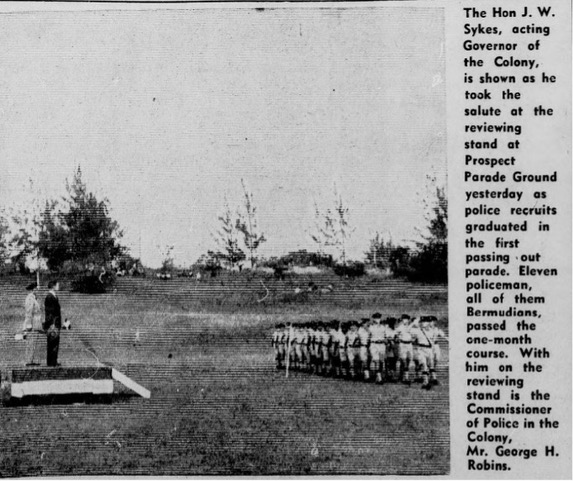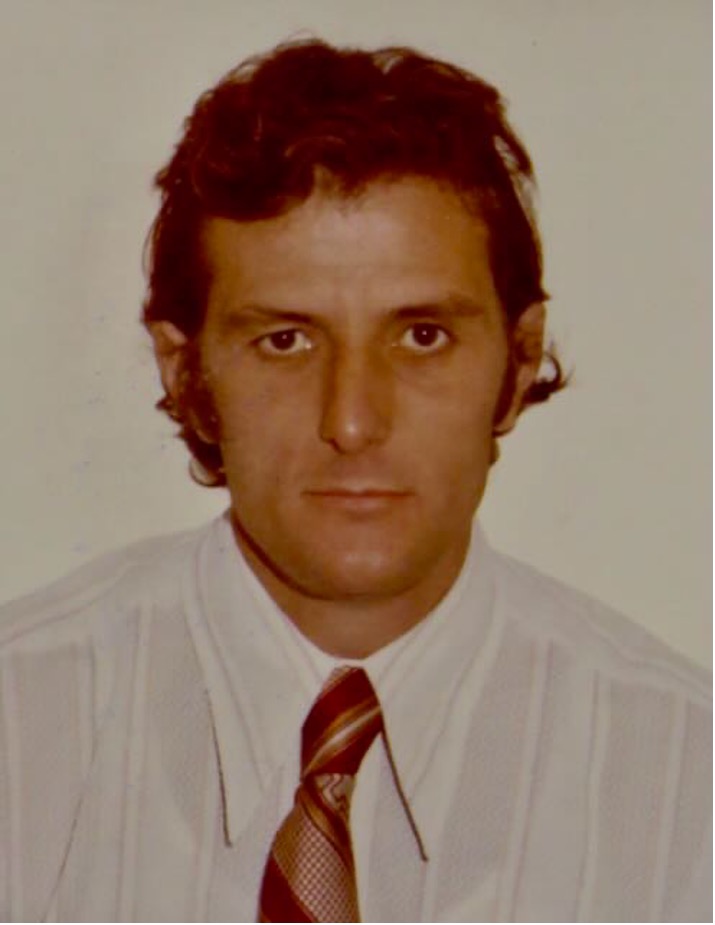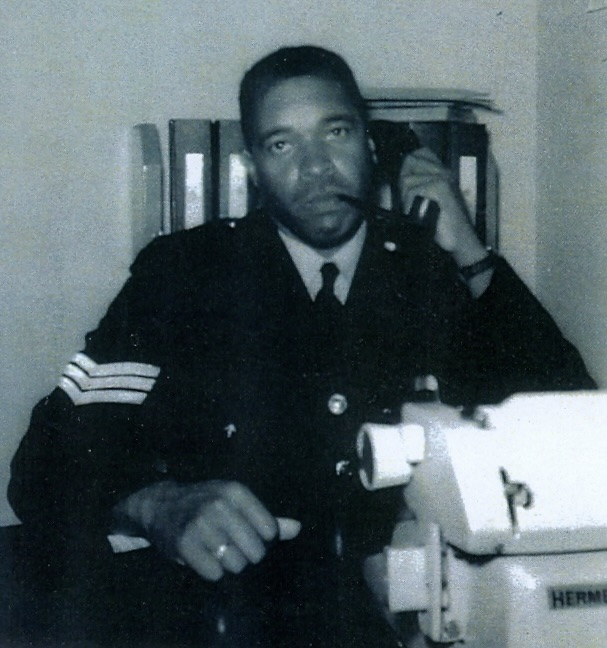Commissioner of Police George H. Robins
1961
INTRODUCTION - This is the first in a series of articles by retired Detective Superintendent George Rose, describing the years during which Mr. George Robins headed the Bermuda Police. Mr. Robins took over as Commissioner in Aprl 1961, at a time of major societal changes in Bermuda as the Island was experiencing some of the most turbulent times in its history. George Rose has carried out extensive research and his articles cite numerous official documents, and media reports.
From the outset Mr. Robins was determined to introduce structural and organisational changes to the way the police operated, which included the setting up of three divisions (Eastern, Western and Central), and a “new” police headquarters which was made possible after the police had acquired the former Prospect Military Garrison.
When asked about his objectives shortly after taking office Mr. Robins listed, “More Bermudians in the Police Force, prompter response in emergencies, and smarter summer uniforms with a possible return to the traditional police helmet made famous by London’s bobbies. He stressed the need for innovations as part of the normal “evolutionary process made necessary by the tide of events, more traffic, greater population, a more intense way of life, and Bermuda’s growing status as a tourist resort.”
Mr Robins envisaged the need for police patrol boats; he sought to increase the police vehicles fleet to include the purchase of minibuses to improve rapid response of eight to twelve police personnel to emergencies, and the setting up of our own Police Training School offering initial training courses on a par with those in the U.K. He also sought to enact some changes to the functioning of the Reserve Constabulary
By the end of the year the Police Force had a centralized police headquarters at Prospect headed by four new Superintendents in charge of 1. “Administration & Finance”; 2. “Crime”; 3. “Operations, Communications & Uniformed Branch”; and 4. “Special Branch” . An experienced policewoman from the UK had been hired with the intention of creating a Policewomen’s Department, 15 women had applied to join the Service, and in December a decision was made for police to upgrade their uniforms, and for male officers to wear “bobby helmets” which were no doubt going to be a big hit with our Bermuda tourists!
GOVERNMENT NOTICE No. 43 – 1961.
Appointment.
The Royal Gazette (RG) Friday, February 17, 1961
His Excellency the Governor has been pleased to appoint G. H. Robins, Esq., M.B.E., K P.M., to be Commissioner of Police with effect from the 2nd April, 1961.
J. W. SYKES. Colonial Secretary.
PROMOTED HEAD OF POLICE EFFECTIVE APRIL 2
Mr. George Herbert Robins will be Commissioner of Police with effect from April 2, according to an announcement made yesterday by the Colonial Secretariat.
Mr. Robins has been Deputy Commissioner since May 17 last year. Mr. Robins succeeds Mr. R. G. Henderson, who will be leaving Bermuda on final retirement on April 2.
Born near Shrewsbury in Shropshire in 1909, Mr. Robins was educated at Kingsland Grange preparatory school near Shrewsbury and then went on to Bromsgrove School, Worcestershire. Also, at Bromsgrove while Mr. Robins was there were Mr. Henry Hallett, headmaster of Saltus Grammar School, and Mr. G. S. C. Tatem. clerk of the House of Assembly.
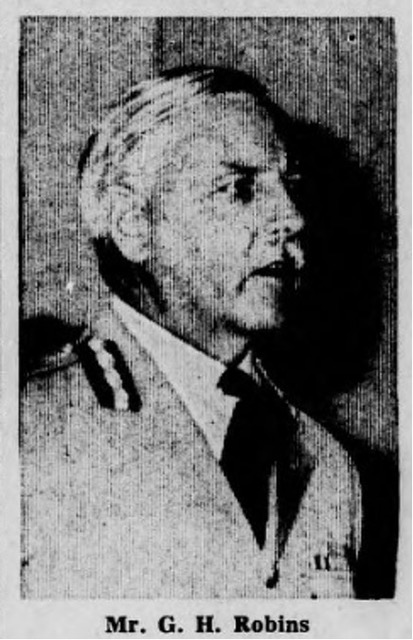
[In 1930] Mr. Robins began his police career in Ceylon as a probationary assistant superintendent. Five years later he married Miss Lou Bedwell in London. They had met in Ceylon. The Robins’ remained in Ceylon for 18 years. At the end of that time Mr. Robins was a superintendent. Then he was transferred to Tanganyika where he took up a post as senior superintendent. In 1950, while on leave, Mr. Robins took a course at the Police College, which was then in Warwickshire, England. During the course he was offered a job as Director of Colonial Police Studies, which he took. He remained at the college for two years and then returned to Tanganyika as assistant commissioner.
This was in January, 1952. In August he took charge of the Western Region of Tanganyika, and a year later he was appointed deputy commissioner at headquarters in Dar-es-Salaam.
On leave in 1954, he attended the conference of Colonial Police Commissioners, and in November of that year he was sent to Cyprus as Commissioner. At that point, Mr. Robins reminisced yesterday, Cyprus was regarded as a pleasant post. But a month after his arrival the Enosis trouble started with a riot of schoolchildren. Soon afterwards the E.O.K.A. began its wave of terrorism.
In January, 1955, Mr. Robins was responsible for the only operation in which a Greek caique (small vessel) was caught bringing arms into the colony.
BOMBINGS
In March the Cyprus Broadcasting Company was blown up and other bombings followed. Mr. Robins was faced with the simultaneous task of fighting the terrorists and reorganizing the police force for the job. Improvements were made, particularly in special branch and communications work.
A commission sent to investigate the Cyprus police later reported that the communications were 15 years ahead of those used in English forces.
During the emergency Mr. Robins was constantly guarded, as were all senior Government officials — among them the Hon. J. W. Sykes, now Bermuda’s Colonial Secretary.
Mr. Robins retired – temporarily – from the Colonial Police in June 1957, after having been transferred from Cyprus and exhausted his leave.
“I was told there was no Colony available which wanted a commissioner,” Mr. Robins said, “so I had to retire.”
But in September of the same year Mr. Robins decided that, despite the offer of other jobs, he knew most about police work, and accepted the post of Deputy Commissioner of Police in the Federation of Nigeria.
In February, 1960. Mr. Robins transferred to Bermuda, arriving here in May after a period of leave.
THREE CHILDREN
The Robins’ have three children. Their eldest daughter, the wife of an Army officer, has two children and is now in Nigeria. Their second daughter is unmarried and working in London, and their youngest child, a son, is also working in London. He was here last year after having taken a course in engineering in Montreal.
Mr. Robins said he was sorry to see Mr. Henderson leave, having served with him in Nigeria and in Bermuda.
CRIME, FIRE PREVENTION TALKS AT CHAMBER OF COMMERCE ANNUAL MEETING
RG Wednesday, February 22, 1961
Members present at the well-attended annual general meeting of the Bermuda Chamber of Commerce yesterday afternoon heard talks on security and prevention of crime and fire prevention with special regard to business premises.
Deputy Commissioner of Police Mr. G. H. Robins gave the talk on security and prevention of crime while Fire Commissioner Mr. Martin Grimes spoke on fire prevention. Mr. Robins urged business heads to have their premises inspected for possible ways by which persons might gain illegal entry. He mentioned among others doors, windows, roofs and skylights. He stated that some establishments in Bermuda had virtually no physical protection at all.
Mr. Robins said that since the fear of detection was great, one of the greatest deterrents against breaking and entering were well lighted premises. He suggested that business places be kept sufficiently lit inside and out at night. He went on to discuss various forms of night-time protection such as burglar alarms and night watchmen and their equipment.
At the end of his talk, Mr. Robins said that he intensely disliked the idea of people keeping revolvers around for self-protection. One acquired a revolver, put it away somewhere and then generally forgot where it was when the time came to use it. In the meantime, someone else might come along and remove it and it could be weeks or months before it was found that it was missing. He added that a revolver was a very dangerous weapon and that unless one was an expert shot it was fairly useless.
COLONY'S FIRST POLICEWOMAN SAYS IT'S A ‘CHALLENGE'
RG WEEKLY – Sunday, March 5, 1961
What must it be like to be the only woman among 270 policemen?
According to Bermuda's first policewoman, Inspector Isabella 'Isobel' Mitchell Lee, aged 38, of Motherwell, Scotland: "It's quite a challenge and I hope that I can keep up the standard we have set back home in Britain."
Inspector Lee, unmarried, friendly and obviously devoted to her work, arrived in Bermuda on Friday to take up her administrative post at Police Headquarters. She will "be responsible for the designing of a summer uniform to be worn by recruits from the "weaker sex" in future.
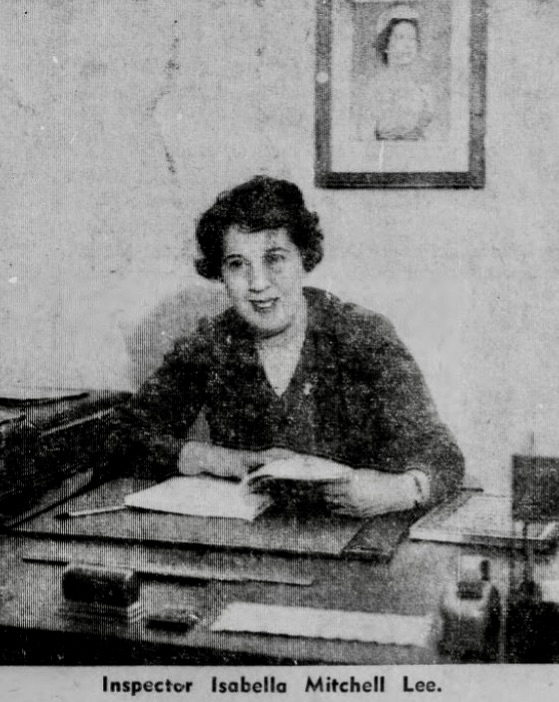
Miss Lee will also be carrying out a survey of the work available to women police in dealing with cases in which women and children are involved. Depending on this survey, said Deputy Commissioner G. H. Robins, it will be decided what the strength of the policewomen detachment should be.
Those recruited will be local women. "I hope we will be able to get them," he said. Being the only female in the force, Miss Lee does not feel out on a limb. "Everyone has been so kind," she said.
She joined the force in 1946 in St. Alban's City. A year later that force amalgamated with the Hertfordshire Constabulary. After completing her basic training there, she went nearer her home in Hamilton Burgh, owing to the illness of her parents.
She then transferred to Stevenage New Town in Hertfordshire, and from there she has come to Bermuda. In addition to her other duties, Miss Lee will look after female prisoners and children.
Asked if criminals took advantage of policewomen, Inspector Lee said that she didn't think so and added that she had had training in self-defense. Miss Lee has completed an instructor's course which will enable her to train local girls when they are recruited. It is expected that another policewoman, a sergeant, will be arriving soon to help her.
Talking about the uniform she would be designing, Miss Lee agreed emphatically with Mr. Robins that the female members of the force would definitely not be seen in Bermuda shorts. It will probably be a simple dress, ankle socks and a peaked cap. Winter uniform will be the same as in Great Britain. They will not carry truncheons and will not be called upon to do night duty.
Mr. Robins said he hoped the new recruits would be able to boast of higher qualifications than the force asks of its male members. Asked if he thought the salary would be an attraction, Mr. Robins replied it was not just a matter of money. “You are dealing with human beings and you must have a sense of vocation,” he said.
The police force in the U.K. numbers 60,000 of whom 2,600 are women.
SUPERINTENDENTS FOR POLICE FORCE ARRIVE TODAY
RG Wednesday, March 29, 1961
Two new superintendents of police for Bermuda arrive here today. They are Mr. R. P. Fielders from the City of Birmingham Police Force. Mr. Fielders will head the Criminal Investigation Department and Mr. Saunders will fill a reorganized post, that of "superintendent in charge of administration and finance."
These arrivals and postings were announced yesterday at Police Headquarters by Mr. G. H. Robins, who will take over as Commissioner of Police on April 2. Mr. Robins called a press conference yesterday to announce three forthcoming retirements and the arrival of new staff.
The three retirements, already scheduled and published, are those of Mr. R. G. Henderson, Commissioner of Police since 1953, Chief Superintendent J. A. Lodge, head of the C.I.D. in Bermuda since July, 1958, and Inspector L. F. Morgan, officer in charge of the Eastern Division since July, 1953.
Inspector Robert Ball of the Western Division will replace Inspector Morgan, and Sergeant A. K. Roberts of Somerset will be placed "temporarily in charge of the Western Division."
MR. HENDERSON APPOINTED COMMISSIONER IN 1953
"In a brief resume on the careers of the officers involved in these changes Mr. Robins recalled that Mr. Henderson, who played rugger for Scotland in 1924, and who was commissioner of police to the northern region of Nigeria to 1949, came to Bermuda in 1953 to take over as commissioner on the retirement of Mr. J. S. McBeath. He is retiring to England and will sail on the Media, on April 2.
Mr. J. A. Lodge, a Durham man, joined the Metropolitan Police (London) in 1931, and arrived in Bermuda in June, 1958 on a three-year contract from retirement. He had previously served in the crime records office and companies frauds department of Scotland Yard, among other appointments. Mr. Lodge, who is married and has three sons, two of them at Saltus Grammar School, will leave the Colony on April 1 on leave, but plans to return. It is understood he is to be secretary-manager of the Riddell's Bay Golf Club.
INSP. MORGAN JOINED IN 1927
Inspector Morgan joined the Bermuda Police Force December 22, 1927, after service in the British Army. He served some years in the Central District (city and environs) before being promoted sergeant in 1946 with the eastern parishes as his bailiwick. He was promoted inspector to July, 1953. He has served under five commissioners.
Mr. Fielders was detective chief inspector with the Birmingham City Police. Born in 1909, he was a major in the Army during the war and saw service to North Africa, Algeria and Italy. He is married but has no children.
Mr. Saunders, born in 1913, was assistant to the chief constable of Portsmouth when he retired to 1959. He had previously been seconded to Cyprus. Married he has three children. His job here, as superintendent in charge of administration and finance, is not a new one, said Mr. Robins. The previous incumbent was Superintendent Percy Miller who doubled in other functions. This time, however, the appointment will be considered separate and inclusive.
WARNING STICKERS LATEST ANTI-THEFT DEVICE OF POLICE
RG Thursday, March 30, 1961
Bermuda's cycle thief gets a left-handed compliment on 5,000 stickers which will eventually decorate the cycles of the unwary.
The stickers, small postcard size, are being issued to police constables with the instruction that they are to paste them on unlocked bicycles. So far, said Mr. G. H. Robins, deputy commissioner of police, yesterday, some two to three thousand stickers have been issued to the force.
The jingle on the sticker says: "You've got to be nimble, you've got to be quick, cause our cycle thieves are mighty slick. Why take the chance and be out of pocket? Don't trust to luck, be smart — and lock it."
Decorated with a police badge and a picture of a vigilant policeman, the card rubs its message in with a picture of a bicycle securely locked with an enormous padlock. Mr. Robins said there used to be a card which policemen showed to owners of bicycles careless of their property, but after consultations between police and the Cycle Protection Association, formed last year after cycle thefts had reached alarming proportions, it had been decided that a sticker was more appropriate and more lasting in effect.
"The idea came from the Customs," he said. "We thought the little Customs sticker an excellent idea.”
He said the situation as regards bicycle thefts had shown “a tremendous improvement” but warned that was no reason for relaxation of vigilance. And, just in case anyone does relax his vigilance, there’s that sticker……
PRESENTATIONS TO RETIRING POLICE CHIEF AND OFFICERS
RG Saturday, April 1, 1961
At a cocktail party at the Police Recreation Club on Thursday night, which was attended by about 300 members of the force and their ladies, presentations were made to the Commissioner of Police, Mr. R. G. Henderson and Mrs. Henderson, Chief Superintendent James A. Lodge and Inspector Leslie Morgan, who leave the force in the near future.
Mr. Henderson presented Mr. Lodge and Mr. Morgan with trays which had been bought with subscriptions by members of the force, and he in turn was presented with a barometer and his wife with an alarm clock, by the deputy Commissioner Mr. G. H. Robins, who is due to become Commissioner as from today.
Mr. R. P. Fielders and Mr. H. M. Saunders, the new superintendents who recently arrived from England, were formally presented to the force by Mr. Robins.
M.C.P.’s QUESTION
ALLEGED ASSAULTS ON POLICEMEN BY THE NEW COMMISSIONER
RG Tuesday, April 4, 1961
Alleged assaults on police officers by the new Commissioner, Mr. G. Robins, are the subject of a question which will be asked in the House of Assembly when it meets next week.
At yesterday's meeting, Mr. Walter Robinson gave notice that he would ask the spokesman for the Police Force, the Hon. James Pearman, the following:
"Why has it been necessary for the Commissioner of Police to discipline his Officers by assaulting them with a walking stick?"
There was a gasp from members when Mr. Robinson read the question. Mr. Robins only took up his duties as Commissioner yesterday.
The House also gave a first reading yesterday to a bill which, if passed, will allow the Police Force to operate minibuses for the conveyance of police personnel. Entitled the Motor Car (Amendment) Bill, it was introduced by the Hon. W. L. Tucker. It is down for a second reading next Monday.
LADY OF MANY TALENTS REDECORATES BLEAK HOUSE
Lou Robins Finds Herself at Home with Many Arts
RG Wednesday, April 5, 1961
Versatile, vivacious and very, very charming is the lovely lady who is chatelaine at Bleak House. She is Mrs. G. Robins, wife of the Police Commissioner, professionally known as Lou Robins; and yesterday we had a thoroughly delightful coffee tete-a-tete at her home.
The house is utterly darling; the walls are a champagne colour, and the comfortable furniture is upholstered in a light matching colour. Scatter rugs adorn the highly polished cedar floors, and in every room there is a beautiful arrangement of flowers ranging from big, bright, deep red roses to light, gay, pussy-willows …… the whole effect being one of sunshine, and coziness.
Lou Robins herself redecorated the entire house - selecting draperies, carpets, as well as the furniture and knick-knacks. A threefold intriguing personality she is a painter of great renown, mother of three children, and grandmother of two, but first and foremost a wife.
She was, born in London, educated there, and completed her education in Paris and Germany.
She studied to be a ballet dancer indeed, spent three years appearing in ballets and opera on the professional stage in England. During this period she went to Ceylon, and was a key witness to a motor car accident there. The young gentleman who was investigating the case was quite taken by this beautiful blonde dancer and after she left to return to London [he] continued to write and call.
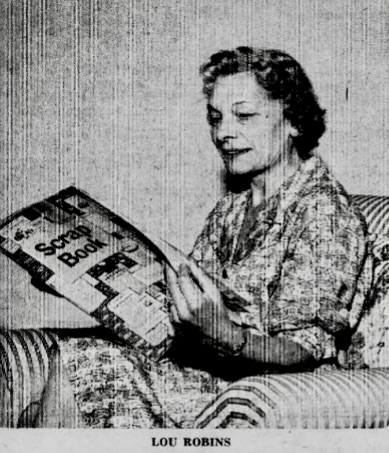
After a two-year courtship and engagement Mr. and Mrs. G. Robins were married in London on February 8, 1935 – "On what was a lovely sunny day," she recalls.
When they were married they had a six-month honeymoon in Berkshire, after which they returned to Ceylon. Mrs. Robins forsook all thoughts of the stage or of any professional endeavor and contented herself raising three children, Pamela, Jenny, and Peter. It was when the three children had grown up and left for London that she took up painting "just as a hobby."
That was after the war, in 1946. Since then she has painted over 350 pictures, and all but two or three have been sold. Lady Stapleton, wife of the governor of Nassau, has a Robins painting hanging in Government House there today.
She has travelled extensively with her husband [and] in 1947 she went to East Africa; then in 1952 to England, then back to East Africa, then to Cyprus. Nigeria [followed], and now "here we are in Bermuda!"
All her children were born in Ceylon, and educated in England. When asked if Mr. Robins encouraged his wife's very pronounced artistic talent she laughed and replied "Oh, he looks at them once in a while."
"Have you painted him?" she was asked. "Oh yes indeed ... he was the subject of my very, first portrait ... I think he mostly slept during all the sittings though.”
She has painted all her children when they were young, and now she’s in the process of painting her two grandchildren, (Pamela’s children) . . . Robert two years old and Fiona who is only six months. Mrs. Robins is very excited because Jenny, her youngest daughter, will be arriving in the Colony for a long overdue holiday next month. Peter visited from England last year. Also next month Pamela and her children are arriving from Nigeria . . . so grandmother will have her hands full!
Mrs. Robins has had six one-man-shows . . . she prefers doing oil paintings but likes all forms of art.
She is a member of the Bermuda Society of Arts and takes part in the exhibitions. She is also a serving sister of Saint John . . . and her other avid hobby is gardening. She is "thrilled about this darling house. [Bleak House] Do you know in all my life I’ve never been in a house longer than 20 months at a time ... I do so hope we can stay here, I love it so, and feel like this house is really our home." This vibrant woman has so much variety in her life ...
"Wouldn't you like to be married to a doctor or lawyer rather than a man of the law? she was asked. "Oh no . . . why I wouldn't know what to do," she exclaimed. Mrs. Robins, besides keeping an immaculate household, does all the cooking, loves to prepare her favorite Chinese food, and she makes and designs all her own clothes. "I don't when my daughter is here, because she is far better than I, but I do enjoy the art of seamstress."
She enjoys any tone of blue for her wardrobe, and wears classic, smart styles with not too many frills because of her small stature. She is slim, has light blue eyes, and champagne coloured hair with a tiny hint of grey at Ihe temples. She is wonderfully, and fetchingly young looking. When she and her husband are "at home" . . . they listen to symphony records, "all good music, although I must admit I enjoy hearing a good rock and roll number at a party now and then . . . but not at home."
Lou Robins herself prefers the impressionist period in art . . . "I admire all periods, but have a soft feeling for this mode."
When she looks for subjects she just gets in her car . . . and drives. When she spots "a face full of character" she descends on her lucky victim . . . takes them home, and promptly sets to "catch the magic something" in a few strokes. She uses this technique with landscape scenes as well.
The pet of the household is a lovely Siamese kitten . . . "Susy Wong", who follows Mrs. Robins everywhere.
It has been said of her paintings "That they evoke the rare feeling of deep human softness of colour understanding, and that looking at any of her work it becomes part of you, the onlooker . . . they are reality come to life."
NEW POLICE HEAD SETS OUT SOME OBJECTIVES
RG Thursday, April 6, 1961
More Bermudians in the Police Force, prompter response in emergency, smarter summer uniforms, and a possible return to the traditional police helmet made famous by London's "bobbies," were among objectives for the force stated yesterday by the new Commissioner.
Mr. G. H. Robins, who took over as Commissioner of Police at the beginning of this week, stressed that innovations planned are part of the normal "evolutionary" process within the force and are made necessary by the tide of events: more traffic, greater population, a more intense pace in Bermuda's way of life, and Bermuda's growing status as a tourist resort.
Discussing organizational matters first, in answer to questions put to him by The Royal Gazette Mr. Robins said more policemen are yet to come from overseas but he would like Bermudians to man their own force.
"I was shocked when I came here to find that to all intents and purpose Bermuda is policed by men from overseas," he said. Incentives would have to be found to attract more men of the right caliber.
Speaking of immediate organizational plans, he outlined a more centralized headquarters than has been known hitherto. Two more superintendents are to be imported, bringing the total to four. Of these, one will be appointed chief superintendent. The rank of deputy commissioner will lapse.
In the headquarters at Prospect the four superintendents will head five branches: administration and finance (two jobs for one man); crime; operations-and-communications (and the uniformed branch); and special branch.
The man in charge of communications will be the chief superintendent.
This evolution in the command structure, Mr. Robins felt, would promote efficiency and minimize waste.
SAVINGS BEING MADE
"In B Division (Administration and Finance) we shall be able to centralize local purchasing and the supervision of (parliamentary) votes," he said, and he claimed that already there had been savings under maintenance subheads.
Asked the function of the special branch, he scuttled any idea that it was composed of "spies."
"A special branch is universally accepted now as a necessary branch of a police force," he declared. "It is the eyes and ears of the government in any place."'
The centralization of the command structure, Mr. Robins said, should not imply that the superintendents were to be glued to their office chairs. "All these officers should spend a fair amount of time looking round. In this way the divisions should get much more personal contact and advice from headquarters."
He was sure there would be far greater efficiency for the money spent, and that it was "a necessary evolution of the Police Force to take care of its greater responsibilities.”
CREATING THREE DIVISIONS
Turning to the geographical layout of Bermuda's police he confirmed what he said last week, the present districts would now be designated divisions …. Western Division, with headquarters Somerset; Eastern Division with headquarters St. George's; Central Division with headquarters in Hamilton.
“They will be commanded by inspectors or chief inspectors," he said. "As far as strength allows each divisional inspector should have a second in command so that he himself can get about."
He noted that there were vacancies at this level and they would be filled by local promotion; he then added that as far as possible all promotions would be filled locally.
"I wish to build up the status of the parish constable," he remarked of the divisional police. “He is the man who gets to know about his parishioners, their troubles, complaints and so on. In support of the parish constable, and backing him, are the C.I.D. and the radio-controlled cars."
Each division, he said, was to have certain cars dealing primarily with divisional matters. Centrally controlled primarily from Prospect, would be the flying squad of specially trained drivers available for call or out on daylight watch. He stressed that he used the expression "flying squad" loosely.
FOUR CARS PER WATCH
He thought it should be possible to have four HQ cars out in any given watch, on the roads, available for traffic regulation and crime prevention. There would be a certain amount of give and take in control of radio cars of all descriptions between divisional and headquarters control but the aim was one ... to get the police to an emergency with utmost dispatch.
"A police car should never really be beyond five minutes' call in Bermuda," he remarked'.
Asked if he had more police recruits coming from abroad, he said he was expecting 12 this month and another 12 in July. However, he wanted to switch the manpower of the force from overseas men to Bermudians.
There would, he hoped, be made available increased basic training facilities for local men, 12 to 16 of them at a time; he had in mind "three months' basic training courses." Advanced and specialized and higher training would continue to take place in England: Bermuda did not have the facilities.
He had been pleased with the result of training in England of men now returned. "It is our purpose not to perpetuate the importation of officers," Mr. Robins added. How that would be done was something which has to be determined. If it was a question of more pay, that was out of his hands; if of special educational courses that, no doubt, could be arranged; whatever it was, the local man should be attracted and, once attracted, have the confidence that there were chevrons in his pocket if he worked for them "just as the traditional soldier has a field marshal's baton in his pack."
Mr. Robins added a rider to these remarks. All men now on the force, or now recruited, would be considered as Bermudian policemen on an equal footing as far as their personal future was concerned.
MORALE AND TURNOUT
"The attraction of Bermudians into the force," he stated categorically, will not prejudice the position of men already in the force."
Of the present equipment available to the police in Bermuda he said: "In the material sense we are not badly off. The laboratory needs a little building up."
Turning finally to morale and turnout Mr. Robins said he was satisfied that the winter uniform was smart; he felt the question of a proper fit of uniform was the only vexation and that could be cured by tailoring. But he was not wholly happy about the cap.
"Many British forces are going back to the helmet," he remarked, "There was a post-war reaction against it and they went in for caps; now the trend is back to the helmet."
Mr. Robins pointed out some of the virtues of the bobby's helmet. It gives a man two or three inches of extra stature; it is cool; it is light; it is a protection from assault; it doesn't lose shape; it is traditional; it is British.
The Governor had let it be known he wished the police to parade on the Queen's Birthday and other State occasions; for this reason a full dress uniform of some sort was now envisaged. Mr. Robins thought white drill jackets and the policeman's normal blue patrol trousers would serve the purpose of providing smartness and economy. The matter was still under discussion.
But of the policeman's summer uniform, he had little good to say. Tuck-in-shirts were not smart; an immediate attempt would be made to smarten them by metal buttons; for the future, however, something would have to be done.
HIGHLIGHTS OF THE WEEK’S NEWS
RG Weekly – Sunday, April 9, 1961
More Bermudians in the Police Force, prompter response in emergency, smarter summer uniforms, and a possible return to the traditional police helmet made famous by London's 'bobbies' were among the objectives for the force stated by the new Commissioner.
Mr. G.H. Robins, who took over as Commissioner of Police at the beginning of this week, stressed that innovations planned are part of the normal "evolutionary" process within the force and are made necessary by the tide of events, more traffic, greater population, a more intense pace in Bermuda's way of life, and Bermuda's growing status as a tourist resort.
RG Tuesday, April 11, 1961
The question by Mr. Walter Robinson about alleged assaults on police officers by the new Commissioner, Mr. G. H. Robins, was given short shrift by the spokesman for the police, the Hon. James Pearman, in the House of Assembly yesterday. Mr. Robinson had asked why it had been necessary for the Commissioner of Police to discipline members of the Police Force by assaulting them with a walking stick.
Mr. Pearman replied that he had been unable to discover any incidents which came within the framework of the question. If it was a serious question, he would appreciate further details. But if it was a jocular question, he wondered if that kind of statement should be made in the House?
The Speaker, Sir John Cox, reminded Mr. Robinson that the rules of the House laid down that if a member made a statement, [then] he must himself be responsible for the accuracy of that statement. Mr. Robinson assured the Speaker that he was aware of the rule and said he would make available to the Hon. James Pearman matters relating to the question.
LIVELY DEBATE OVER MINI-BUSES FoR POLICE
RG Tuesday, April 11, 1961
An alleged black market in taxi licences and congestion on the roads were among subjects given an airing in the House of Assembly yesterday when members considered a request by the Bermuda Police Force for permission to operate mini-buses.
The request was contained in the Motor Car (Amendment) bill, which was eventually passed by 18 votes to 12. The size of "the mini-buses, the number that would be needed, and the use to which they would be put were questions that generated the most heat, but members also referred to the requirements of other departments as well as other items.
Introducing the second reading, the Hon. W. L. Tucker, chairman of the Transport Control Board, said the amendment was a simple one. It enabled the police force to use a small number — probably four — of Morris mini-buses, similar to the airport limousines. They would be used for carrying police officers, prisoners and stores. They would carry from eight to 12 people. Each vehicle measured 171 inches long arid 74 inches wide. The amendment should not be confused with the Jaguar cars, the member said.
OBJECTION TO LENGTH
Mr. A. E. Nicholl said he had no objection to the buses, but objected to their length. "We should do everything possible to get these buses and cars off the roads," he said. '"The roads are narrow and are getting more congested every day. We are bringing in buses and cars that are too long. When you meet these buses on the roads they are absolutely a menace.”
Mr. Nicholl asked if it was possible to get smaller buses. He felt the time had come when small buses and cars should be adopted as the proper form of transport. Mr. M. A. Gibbons asked Mr. W. L. Tucker if he had considered stopping the black market in taxi licences, but Mr. Robert Outerbridge suggested that the question was out of order.
PUBLIC INTEREST
"I was only going to ask him to look into it,'' retorted Mr. Gibbons. "This is of public interest. You should not be trading black market licences when it is a Government business. I ask Mr. Tucker's board to reconsider the matter. "Taxi drivers should turn these licences back to the board to be issued to the next one in line."
Mr. E. T. Richards asked how many buses would be required by the police: He was not sure because he did not think he was on the T.C.B. at the time it was discussed. "You were," said Mr. W. L. Tucker, "but you were asleep." Mr. Richards said there was a good argument for the police having mini-buses, but if the House allowed this, it would have to let the hotels have them as well. "You only have to get them for one organization and by the time the year is out you will have many other petitions before the House from other organizations," he said.
BETTER CASE SHOULD BE MADE FOR MINI-BUSES
The member felt that the House's acceptance would set off a long train of reaction, as taxi-operators and other people would come forward. He felt that a much better case should be made out for the police. "If the police want to get around, they have wagons — two or three black Marias — and so on. I am not too sure what is envisaged by this, if they want to transport police to St. George's, Warwick or Admiralty House, or what. It is the thin end of the wedge."
Dr. W. H. C. Masters asked if it meant that the police were going to form a riot squad, because the mini-buses must be needed for official business. He felt that in certain instances other departments should be able to bring in vehicles whose measurements did not conform to the regulations. He recalled ……
He wondered if the bill indicated a change in policy. "We have got to have these vehicles," he added, "but I agree that we do not want bigger cars…… it’s quite ridiculous if we cannot have something only 171 inches long."
Mr. C. V. Burch said he wanted to assist the member-in-charge as much as he could, but he could not go along with the measure. It was, as Mr. Richards had said, the thin end of the wedge. Bermuda had enough cars as it was and he did not think, mini-buses were necessary.
SIX VEHICLES WANTED
The Hon. James Pearman thought members should get the matter into proper perspective. The police had a need for a dual-purpose vehicle to carry officers, prisoners and stores. They wanted six vehicles, one for St. George's, one for Somerset and four in the central area. "There is nothing to stop the police from purchasing heavy trucks, 210 inches long and 76 inches wide," he pointed out.
“They actually have one, but what they want is a mini-bus. They have already cut the length down to 171 inches."
Mr. Pearman said the airport limousines were over 200 inches long, and the police had in fact done what Mr. Nicholl had asked. It would be seen that what the police were asking for was not very much at all. The mini-buses were smaller than vehicles which the police already had the power to purchase, and they would be the proper vehicle as far as the public were concerned.
The force had a strength of 220 men and it must be apparent it was necessary one should be able to transport men together in some sort of vehicle, Mr. Pearman said.
"When the problems were going on in Warwick 18 months ago this was a difficulty, because the police had no vehicle with which to do this and a similar problem of this type is bound to arise from time to time. It will make them mobile, but not for a riot squad. They could be used to take men to the disorders that often break out, for instance in Reid Street," Mr. Pearman added. "They could also be used for transporting materials."
Mr. G. O. Ratteray asked if the acquisition of the mini-buses would mean a reduction in the force's request for other forms of transport. “They could do without the cars and motor-cycles that take up half of Parliament Street," he said.
PARKINSON'S LAW
Dr. Masters said he was perturbed by what Mr. Pearman had said. It would seem from Parkinson's Law that six more men to drive them would be needed.
Mr. S. S. Toddings said he could not swallow the measure. What was the purpose of the Motor Car Act if the police could apply to the T.C.B. for permission to purchase lorries. "All I have to say is that this is the thin edge of the wedge. Motorization has become such a menace that it is going to ruin the tourist trade. I hope the time is coming when we can discuss the Motor Car Act without you (the chairman, Mr. G. Powell) having a gavel in your hand."
"Why isn't an import tax put on to stop these cars coming in?" Mr. Toddings asked. "I won't answer that question because I know why. We all know why. It would strike at the very economy of our country if these high-pressure salesmen were not allowed to go through the country by-passing the Instalment Act."
Mr. Toddings said the result was that the Colony had a lot of irresponsible people driving around who were a menace to the responsible people. "I don’t believe the T.C.B. would allow the police to have trucks," he added. "They were never meant for transporting personnel. When the honorable member (Mr. Pearman) is as smooth as he was this afternoon, I am a little suspicious. He is just feeding you out of the palm of his hand." (Laughter). "The former Police Commissioner I had a great deal of confidence in," Mr. Toddings concluded. "Why didn’t he ask for them?"
Mr. Robert Outerbridge said that, because the measure was the only order of the day, members apparently felt they should talk a lot. "The Commissioner feels the force would be best served by a vehicle of this type, and before he can bring in a resolve he has got to have our permission. It must receive the Finance Committee's blessing which I am sure it has not at the moment. "I see the need for this type of vehicle and I don't think we should set ourselves up as experts. If he thinks he has a case, he should get a sympathetic hearing."
THIRTY-SIX EXPERTS
Mr. John Patton thought the police were the people who should decide what vehicles they needed, not the 36 experts in police work sitting in the House. "I would rather give them six mini-buses than 10 private cars," he said. "At least we will know what they are, instead of having private cars running around." Mr. Patton added that it seemed that other people wanted mini-buses and he felt taxi drivers should be able to own them.
Mr. M. A. Gibbons thought the bill was the cart before the horse. He did not dream the police were going to come along later and ask for the money for the mini-buses. "The new Commissioner should have sent a minute here, saying what he needs them for, how many he wants, what they will cost, and generally putting his cards on the table," he said.
ENOUGH VEHICLES
"I think we have enough vehicles on the roads, and I see an enormous number of buses lying idle. We have too many of them." Mr. Gibbons said the Commissioner was new and had never been in complete charge here before. The previous Commissioner could have sent this measure up, but had obviously not thought it necessary. However, the new blood thought six were needed at one go. The speaker thought one or two at a time would be a better way. He could not support this "camouflage way."
Mr. Earle Outerbridge wanted to know how many cars and motor-cycles the force had. He reckoned that if there were 220 men working an eight-hour day there would be 80 on at one time. The House had voted money to centralize the police at Prospect. When he was young he could run from Prospect to Hamilton in ten minutes. A good Government did not have riots, and those that prepared for war got war. He could not see the reason for the minibuses.
Mr. Walter Robinson said the number of buses would be decided later by the Legislature. He did not think the buses were necessary, but nor did he think the House should oppose the amendment.
Mr. L. M. Barnes complained that police vehicles were left out in all weathers in Hamilton and would obviously not last long. It would be a saving in the long run to build garage space for them. "The Commissioner should come forward and tell us just why he needs these vehicles," the member added.
Mr. Pearman said the police had garages at Prospect and were doing all their own maintenance apart from major overhauls.
Mr. W. L. Tucker said the Board were concerned about the traffic in taxi licences and hoped to do something about it. As for the needs of other departments, each case would be decided on its merits.
The bill was then passed by 18 votes to 12. The entire Finance Committee were among the members against the measure, which prompted Mr. S. S. Toddings to remark: "Where are you going to get the money from? The Finance Committee is over here!" (Laughter).
MRS. LOU ROBINS GUEST SPEAKER
RG Wednesday, May 3, 1961
''If you are satisfied with yourself you are able to help others." This was the essence of Mrs. Robin's speech to Beta Sigma Phi at their 30th anniversary dinner held at Deepdene Manor Hotel. Mrs. Robin was the guest speaker. She is the Police Commissioner's wife. She mentioned her many travels which include, Ceylon, Nigeria and East Africa. The theme of her speech was the organisation's Latin motto Vita, Scientia, Amicitia, which means life, learning, and friendship. She pointed out life is to be lived with one’s fullest capacity. It is good for one's inner satisfaction to cultivate an art of some sort. This is exactly what she did in Nigeria. During a time of turmoil, she turned to painting and has been at it ever since.
The next vital point of her speech was interest. Through interest one’s scope of knowledge becomes broader and through many interests one is bound to make friends. It is inevitable. At the dinner, officers for the incoming year were installed.
ALLEGED ASSAULTS BY COMMISSIONER ON POLICEMEN
RG Thursday, May 11, 1961
Mr. Walter Robinson said in the House of Assembly yesterday his enquiries into alleged assaults on police officers by the Commissioner, Mr. G. H. Robins, though not completed, had not yet produced anything to lead him to believe allegations were untrue.
He was answering a series of questions tabled by the Hon. W. L. Tucker regarding Mr. Robinson's own question some weeks ago about the alleged assaults. Mr. Tucker had asked:
"1. Has any follow-up been taken in the matter of the very serious allegations made by you recently in the House of Assembly against the Commissioner of Police?
"2. If the answer is in the affirmative, were these allegations true?"
"3. If in the negative, what is the cause for the delay?"
Mr. Robinson replied that the answer to the first question was "Yes."
With regard to the second, the enquiries he had been making were not completed, but nothing so far had led him to believe they were untrue. As far as he was concerned there had been no delay.
Mr. Tucker remarked that in view of the seriousness of the allegations made by the member, the matter should be cleared up as soon as possible. He wondered if the member had approached the Hon. James Pearman, who was spokesman for the Police Department.
NOT COMPLETED
Mr. Robinson replied he would not approach the spokesman until he had completed his enquiries. Mr. Pearman asked to what extent he made enquiries before raising the matter originally. Mr. Robinson said he had a complaint made to him with respect to the matter about two and a half weeks before he asked his question. He had no reason to doubt the veracity of his complainant and accordingly he asked the question to bring to the notice of the Commissioner the fact that complaints had been made.
Mr. Tucker: "Does the member intend to pursue this further, and if not, will he make some retraction?"
"This type of action has ceased," replied Mr. Robinson, "but I will pursue the matter further if necessary."
At this point Mr. Henry Vesey raised the question of procedure with regard to members asking questions, and then having questions asked about their questions.
RULE BOOK
The rule book, he said, laid down that question time was provided so that members could ask questions of members who were responsible for various Government departments.
Was this procedure to be adhered to? In the matter under consideration, it might develop along a line of inquisition.
The Speaker, Sir John Cox, said the rules made it possible for members to ask questions of any other member, with special provisos included with regard to members of the Executive Council.
If the question contained a statement, as in the case of Mr. Robinson, the member had to be responsible for the accuracy of that statement. Mr. Tucker was seeking to establish whether Mr. Robinson was now in a position to substantiate his statement, but the member had evaded this at length.
"Perhaps he (Mr. Vesey) could bring this matter up later, but not now," continued the Speaker, "because question time is now closed." (Laughter.)
Mr. Vesey did in fact bring the matter up later. Speaking on a motion to adjourn, he pointed out that the rules laid down that questions should relate to matters to do with the House. He questioned the wisdom of Mr. Robinson asking his question. He suggested there were other ways of bringing the matter up, such as a select committee.
He reminded the Speaker that if a member made a mis-statement he (the Speaker) had the power to make him apologize in public. He was not seeking a ruling, he just wanted to have question time conducted in an orderly manner instead of these questions and counter-questions being bandied about.
The Speaker said the rules made it quite clear Mr. Tucker was within his rights.
POLICE FEDERATION BEING DISCUSSED: NOT UNIONISATION
RG Thursday, May 11,1961
A form of association of Bermuda's policemen is in the making. The commissioner of police, Mr. G. H, Robins, in answer to a question, told The Royal Gazette yesterday it was true, as rumored, that a "federation" of policemen in the Colony had been discussed. It was not true that the word, "federation" meant unionization.
Police were not allowed to form unions, here or elsewhere, he observed. What is proposed for Bermuda's police, he said, is a form of association on the lines of similar organizations in other countries, notably the United Kingdom. It would take care of internal matters in which policemen, as individuals, ought to have a say, matters such as leave, conditions of service, uniform and so on. "Specifically excluded," said Mr. Robins, "are matters of promotion and discipline affecting the individual."
"Up till now," said the commissioner, "I have been handling such matters — instance the question of wet weather uniform — by forming ad hoc committees (in the force). What is now proposed is an association on the lines of the Police Federation as it exists in the United Kingdom."
Superintendent H. M. Saunders, who has been in charge of administration and finance since he arrived in the Colony at the end of March, explained that the many local police forces of England and Wales have a form of association known as the Police Federation, which is "permitted by Act of Parliament and governed by police regulations," on which all ranks are represented, both locally and nationally, up to the point at which there is a Member of Parliament who acts as "adviser" to the joint central committee.
Asked whether the local association, if and when formed, would include an M.C.P. to act as "adviser," Mr. Robins smiled and said he did not think so; however, the pattern in which constables, sergeants and inspectors are represented in the U.K. by elected delegates of their own rank, seemed to appeal to him. The need for some such association for Bermuda's policemen, and Mr. Robins stressed "all Bermuda's policemen, both those from overseas and those who are Bermudian,” has grown with the force, it was understood.
Any connection between the move to form an association and last week's unofficial protest by some policemen (among other servants of the Crown) at some of the proposals contained in the Civil Service Committee's recommendations to the House, was purely fortuitous, it was inferred. However, the association, once formed, would take care of the policeman's point of view on such matters, vis-a-vis the Government.
Mr. Robins was asked if the right of policemen in Bermuda to associate would be written into police regulations. His reply was non-committal; it was a matter for the Government rather than himself to comment on that. However, the Government was aware of the move to form the association.
CUSTOMS MEN HOLD “INFORMAL” MEETING
RG Saturday, May 13, 1961
[Referencing the Bermuda police, a continuation of the subject matter contained the following observations:]
Last week criticisms of suggested new (shorter) leave arrangements, (since approved by the House of Assembly) reported as "making the rounds" in the Civil Service, especially in the Police Force and Customs Service.
Confirmation of news of the formation of a police association followed quickly on this report. It is presumed that last night's meeting of the Customs discussed similar matters. Last week a Customs officer alluded to the overtime men of the department put in without extra pay. "There is a great deal of unrest in the Customs office he said. "There is no-one to speak for us except you. Some men work 16 hours a day for no extra pay and this applies when the Queen of Bermuda is in Hamilton.”
INSIDE PARLIAMENT by Bryan Darby
RG WEEKLY – Sunday May 14, 1961
A member I do not envy at the moment is Mr. Walter Robinson. You will recall that recently he asked a question in the House about alleged assaults on police officers by the Commissioner, Mr. G. H. Robins.
He is now being parried a little by such members as the Hon. W. L. Tucker and the Hon. James Pearman into making an apology for his remarks. The member is standing firm, however, and has stressed that his investigations will go on. He also pointed out that the alleged action complained of had since ceased, and there seemed little point in pursuing the matter.
His antagonists would have none of it, and pressed him for a more definite statement, and the affair was only saved from becoming an "inquisition" by Mr. Henry Vesey raising the matter of question-time procedure.
SPECIFICALLY EXCLUDED FROM TERMS OF REFERENCE
RG Monday, May 15, 1961
With reference to the proposed formation of a Bermuda Police Association, the Commissioner of Police, Mr. G. H. Robins, points out that matters of promotion and discipline affecting the individual will be specifically excluded from the association's terms of reference, as correctly reported by The Royal Gazette on Thursday.
The Royal Gazette erroneously re-quoted him in Saturday's issue as having said that such matters would be specifically included, in the terms at reference.
POLICE BALL AT CASTLE HARBOUR HOTEL
RG WEEKLY – Sunday, May 21, 1961
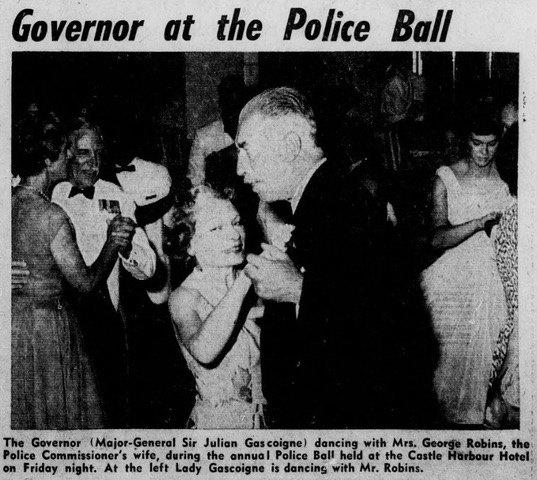
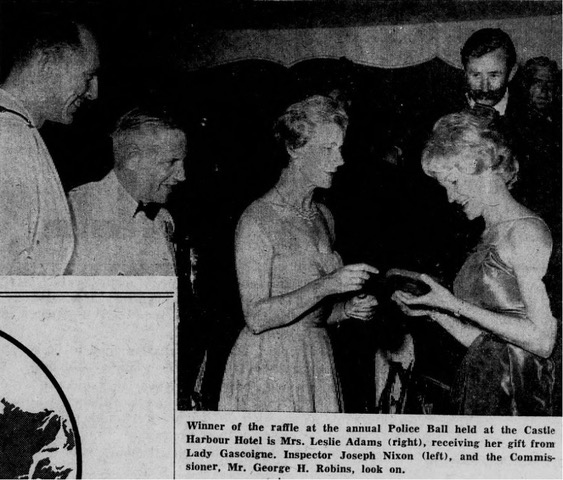

PATROL BOATS FOR HAMILTON HARBOUR
RG Tuesday, May 23, 1961
The Commissioner of Police Mr. G. H. Robins, yesterday had no comment on the refusal by the Corporation of Hamilton to assist the police in obtaining and operating two powerboats for patrolling Hamilton Harbour. The Corporation, in its meeting last Tuesday, said that it would, however, help the police in the chartering of a suitable vessel for patrol work on Thursday afternoons and Sundays.
POLICE DUTY HOURS ARE PILING UP
RG Wednesday, June 14, 1961
The Bermuda Police Force is so much in debt to its men in terms of extra duty service that "if you gave the whole force ten days' leave you'd just clear it off." This was stated yesterday by the Commissioner of Police, Mr. G. H. Robins, in comment on a series of questions put to him by The Royal Gazettes These were:
- How far short of establishment is the Bermuda Police Force now? The answer: "We are still 58 short of 274."
- How long will it take to make up the deficiency? "It is my opinion," replied Mr. Robins, "that the reduction in the deficiency will be slow."
- Would that opinion result from the present turmoil over terms of service for Civil servants? No comment.
- How does the lack of a full establishment affect the efficiency of the force? "Essential jobs are only kept going," replied the Commissioner, "by doing extra duty to the extent now of at least 10,000 hours ... an average of 50 hours a man."
- Is there any provision for recompense in the form of overtime nay? "No. The hours are owed. If you gave the whole force ten days' leave you'd just clear it off."
- Asked if Bermuda needed a police force with an establishment of 274, and, as a corollary, how this establishment per head of population compared with other similar resorts, Mr. Robins replied that to achieve the true efficiency required of the force ("a policeman never more than five minutes away" – was one way of expressing this) the establishment was indeed necessary. As to the second part of the question Bermuda had, perhaps, a higher proportion of policemen per hundred inhabitants than other places but it had a normal establishment if the normal population of tourists was included, as it must be for policing purposes.
- Turning to the question of changes in the uniform of Bermuda's policemen, Mr. Robins said that, final approval from higher authority had not yet been given but a policeman in the proposed full-dress uniform of "bobby" helmet, white tunic, blue web belt with metal clasp and blue serge trousers was on duty at the Castle Harbour Hotel during the policemen's ball recently held there. This uniform had excited no adverse comment. It was proposed shortly to parade the full dress for the inspection of the Governor-in- Council after which, if approved, photographs of it would be made available to the press.
- Asked if it was proposed to put policemen into bobby helmets for ordinary duty Mr. Robins said it was proposed. He added that the full-dress uniform helmet would bear a metal spike, chain and badge. Summer uniform, if approved, would be shorts and tuck-in shirts with shone metal buttons for ranks up to inspector. Officers wearing "pips" — which included inspectors and up — would wear Colonial Police pattern bush jackets with shorts and Sam Brownes or cloth belt according to need or option.
POLICE TRAINING CENTRE BEING SET UP NOW
RG WEEKLY – Sunday June 18, 1961
A police training center is now being set up in the old guard-room at Prospect, and when this is in operation the Polce Commissioner hopes to be able to encourage more qualified Bermudians into the force. He said yesterday he hoped to man the "school" with a fully-trained [staff] whose basic courses would be supplemented by specialists already here who could instruct on their own departments — fingerprinting, photography, court procedure and so forth. The guard-room is now being got ready, he said, for this center.
Speaking to the RG on Tuesday, Mr. G. H. Robins said the force was in so much debt to its men in terms of extra duty service that "if you gave the whole force ten days' leave you'd just clear it off."
Asked what the state now was of the police association being mooted in the force, he replied it was now in being and was fully representative of all ranks up to but not including the executive level.
TWO QUESTIONS ABOUT POLICE DEFERRED
RG Thursday, June 22, 1961
Due to the late arrival in the House of Assembly the day before, of the Hon. James Pearman, spokesman for the Police Force, the questions tabled by two members, Mr. A. A. Francis and Mr. Walter Robinson, remained unanswered. But another Police matter, the abolishing of the rank of deputy police commissioner, was considered by the House and passed with little-debate.
Mr. C. V. Zuill told members the matter of replacing the Deputy Commissioner with a Chief Superintendent had been agreed to in the House in November of last year.
Mr. Francis asked what the reason was for the proposed change. He understood that since time hallowed it had been the practice in every other colony to have a deputy police commissioner. Mr. Zuill said the change had been recommended by the police authorities, approved by the Governor-in-Council and agreed to by the House.
In the reorganization of the force no need was seen for a deputy police commissioner. The Police (Change of Establishment) Bill was then passed without further debate.
The two questions, which deal with the recruitment of officers and the employment of policemen who resign from the force, will be brought up again, it is assumed, when the House meets on Friday.
The Speaker, Sir. John Cox, remarking that the member was not in the House to answer the questions, added: "I hope and expect him to do so on the next day of meeting."
POLICE CHIEF IN ROAD ACCIDENT
RG WEEKLY – Sunday, July 23, 1961
A small boy was involved ta an accident involving a car driven by Police Commissioner G. Robins on Thursday night. A police spokesman said the Commissioner was driving his car along the South Shore Road when the child ran in front. The boy was taken to hospital, given a routine examination, and discharged immediately afterwards. The accident was described as minor.
SERIOUS MISGIVINGS ABOUT CIVIL SERVICE LEAVE REDUCTIONS
RG Tuesday, August 1, 1961
Members of Bermuda's Legislature heard the Governor, Major-General Sir Julian Gascoigne, voice "serious misgivings" about the leave reduction passed for the Civil Service, and support the decision of the Legislative Council to study the franchise bill, when he closed the present session yesterday. Speaking during the short, traditional prorogation ceremony in the Legislative Council chamber shortly after 2.30 p.m., His Excellency added that, though two-thirds of the Colony's established Civil servants had chosen to remain on their old conditions, new entrants would have no choice. This, he feared, would prove a serious deterrent to recruitment, both locally and overseas, and he urged the Parliament, if this happened, to reconsider the matter.
The Governor mentioned in his survey of "the most momentous year in the history of the Colony" the 11 per cent increase in tourist figures which, he felt reflected great credit on the activities of the Trade Development Board. He also congratulated Sir Henry Tucker on his knighthood and intimated that he might be in a position in the near future to announce the appointment of a new Chief Justice. The proceedings for the annual summer recess, which will last until October 25, began at 2 p.m. …..
After a short, formal meeting the House waited the arrival of the Governor’s messenger, Police Commissioner G. H. Robins. At 2.25 p.m. the sergeant-at-arms, Mr. Henry Joliffe, announced that he was waiting outside. Lt.-Col. Astwood asked that he be admitted, and the commissioner, in full ceremonial dress, entered and announced that His Excellency awaited the members in the Council chamber. In brilliant sunshine, the M.C.P.s filed down to the Colonial Secretariat to join members of the Council in hearing the Governor's address.
NEW CHIEF JUSTICE HERE WAS JUDGE IN NIGERIA
RG August 10, 1961
Bermuda's next Chief Justice has been named. He is Mr. Justice M. J. Abbott, who retired as a Federal Judge of Nigeria in February this year. He is expected to arrive in the Colony about mid-September, according to the Colonial Secretariat. The post of Chief Justice of Bermuda has been vacant since the retirement of Sir Newnham Worley last year. At present the highest judicial office of the Colony is occupied by Sir Allan Smith, acting Chief Justice.
Yesterday Sir Allan told The Royal Gazette he would remain on the bench as Assistant Justice. Mr. Justice Abbott already has affiliations with the Colony. Mr. G. H. Robins, Commissioner of Police, who knew him in Nigeria, and last saw him in Lagos in 1959, remarked yesterday that Mr. Abbott's daughter is married to Nigel Stourton, son of Sir Ivo Stourton, once Commissioner of Police in Bermuda and Inspector General of Colonial Police Forces. Nigel, recalled Chief Superintendent F. B. Williams, who also knew the Abbots in Nigeria, received part of his education at Saltus Grammar School.
The official notification of Mr. Justice Abbott's appointment reads as follows: "Her Majesty the Queen has been graciously pleased to approve the appointment of Mr. Justice M. J. Abbott as Chief Justice, Bermuda."
SEVEN BERMUDIANS PASS POLICE ‘3-R’s’ COURSE
RG Tuesday, September 5, 1961
Seven out of nine entrants in the first "Police 3-Rs" course passed their examinations last week-end with flying colours and have been appointed probationary constables. Giving this "encouraging" news yesterday, Chief Superintendent H. M. Saunders said it was hoped to have 32 Bermudians in the Force by this time next year and to reach the full establishment.
The course ended on Friday with an examination in English, which included a written essay, spelling and punctuation exercises, and papers on arithmetic and general knowledge. "It was a stiffer paper than usual and seven out of nine is a good percentage," remarked Mr. Saunders.
Top of the class was Glynn Lefroy Washington, of Sandys, who achieved 87.85 per cent. The other six to beat the 55 per cent pass mark were: Lennett Morris Edwards, of Baileys Bay; Custerfield Desmond Crockwell, of Devonshire; Reginald Lefroy Tuckett, of Hamilton; Gilmore Charles Ruthborne Simons, of Sandys; Edward Conrad Foggo, of St. David's; and Philip Clarence David Smith, of St. George's. The examination was organized and presented by Mr. V. F. Scott, a former local headmaster, helped by his wife and son. "As the Commissioner, Mr. G. Robins, has said, the course has proved its worth, and Mr. Scott is to be congratulated," said the Chief Superintendent.
The successful seven will now undergo a training course with five other Bermudians who have just joined. The group will be taught everything connected with police work from traffic signals to life saving. Their lecturers will include all the inspectors and sergeants, plus a number of constables with specialized knowledge. The next "3-Rs" course will be held when the need arises.
THE COMMISSIONER AS GUEST SPEAKER AT FORUM
The Bermuda Recorder edition on Saturday, 16 September, 1961 carried the following announcement of a presentation by the Commissioner as guest speaker at a forum to be held at the Warwick Workmen’s Club.
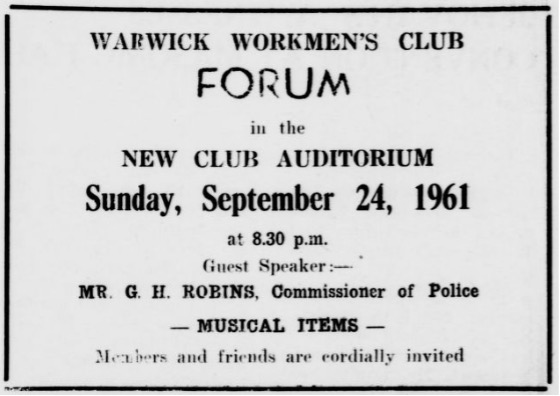
A similar announcement appeared in the RG on Saturday, 23 September, 1961.
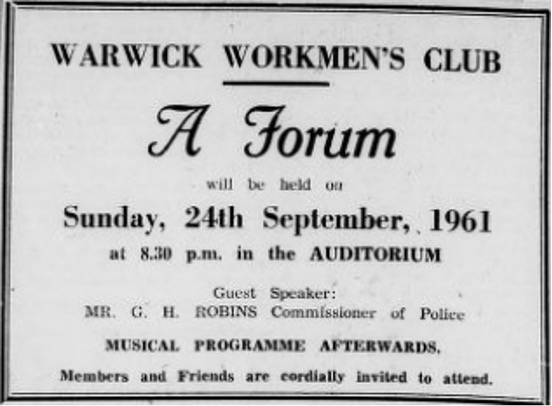
LAW OR ANARCHY IS QUESTION PUT BY POLICE CHIEF
RG Monday, September 25, 1961
"Are you going to have law or anarchy? That is the question you must face up to." Mr. G. H. Robins, Commissioner of Police posed this question to a large audience at the first forum of the Warwick Workmen's Club yesterday evening. Mr. Robins told the group there was no halfway house. If they wanted law and law enforcement they must have a police force. He said the public pays for the police force and they are not getting what they paid for unless the police get full cooperation from the public in enforcing the laws.
POLICE MERELY ENFORCE THE LAWS
This is the idea which older Bermudians must instill in the younger generation. Mr. Robins said if people are going to get angry with something they should not get angry with the police, they should get angry with the law. The police merely enforce the laws. The Commissioner said he was shocked when he came to Bermuda to find that a certain segment of the population often prevented the police from carrying out their duties. He said this interference particularly occurs when the police are trying to take into custody a drunken person. Mr. Robins said he has found this more prevalent in Bermuda than anywhere else he has served. (Mr. Robins has been in police work in Ceylon, Tanganyika, Cyprus and Nigeria.) "If you want an efficient police force we will give you an efficient police force," Mr. Robins continued. "We are all here to serve the public."
COMMON LAW AND STATUTE LAW
He said in areas where there is not local government the people feel the police are agents of an alien or foreign power, and antipathy and apathy towards the police develop. He was surprised to find the same attitude among certain elements of the population in Bermuda, a colony which has had local government for the majority of its existence.
"Common Law," Mr. Robins explained, "is the way people must follow to get along with one another." Statute law is made by the representatives of the people for the guidance and good government of the people. All the Bermuda laws have been passed by the House of Assembly for the people of Bermuda. People may not like them, but they must follow them. Explaining law enforcement, Mr. Robins said in early England it was the mutual responsibility of everyone in the community to find wrongdoers. Soon, the people of the growing communities began hiring specialized people to enforce the laws that were made by the community. It was at this point that the marriage of law and law enforcement took place.
THE NEED FOR LAWS
Mr. Robins said if the people can learn that the police are enforcing the laws that the people themselves have made the "troubles of the present and the possible troubles of the future would diminish." The laws are not made by the police, all the police do is enforce them and try to make life more pleasant for those living under the laws, Mr. Robins noted.
He explained the need for laws by using the example of the speed laws. He said if a person is hit by someone riding an auxiliary bicycle going at 10 miles per hour the person will end up with abrasions and bruises at the worst. But if the person is hit by an auxiliary bicycle going 30 or 35 miles per hour they might be killed. Thus, he continued, there is a law against speeding.
The main function of the police, he said, is the protection of persons and property. "And, they come in that order," he added. To protect persons the police enforce laws such as speeding, he said. To protect property, police constables patrol the streets of Hamilton. Commenting on the recent spate of noisy auxiliary bicycles and speeding "Teddy Boys," Mr. Robins said: "Speed kills, noise merely annoys. Unfortunately, most noise comes from speeding cycles."
Mr. Robins was introduced by Mr. Leon Bean and thanked by Mr. Warren Simmons. Before and after the talk, Mr. Walter Tucker entertained the audience with piano music.
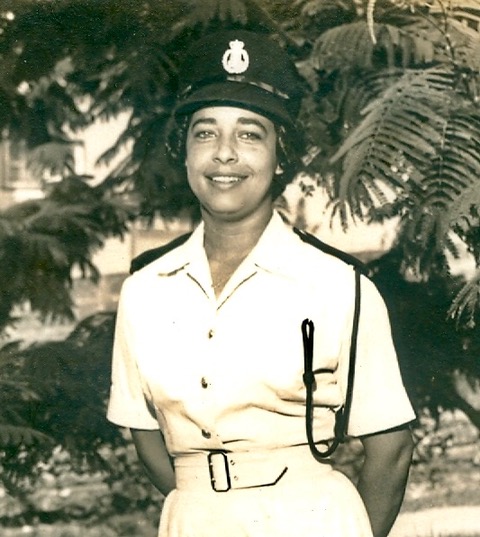 Woman Inspector Jean (Mathis) Vickers
Woman Inspector Jean (Mathis) Vickers
EDITORS NOTE
One member of the audience at the Warwick Workmen's Club who had been particuarly drawn to Commissioner Robins' presentation was a young lady, Ms. Jean Mathis who went on to join the Police Force as a direct result of that meeting.
Many years later, when asked what sparked her interest in the joining the Police, Jean had no hesitation in giving credit to former Commissioner of Police, George Robins, who "organized a forum at the Warwick Workmen's Club in late 1961, to which he invited any Bermudian women who might be interested in joining the Police Force. Jean vividly recalls that she was one of 13 women who went along that evening. Commissioner Robins told her "right off the bat" that he was looking for people with her personality. She promptly took the entrance exam and passed with flying colours.
Jean officially joined the Police Force in January 1962 as our first Bermudian woman police officer, and went on to make history as the Inspector in charge of the Police Women's Department. CLICK HERE to read Jean's personal recollections of her many years service in the Bermuda Police
POLICE CHIEF SUGGESTS:
RACE TRACK FOR CYCLISTS TO LET OFF STEAM
RG Thursday, September 28, 1961
A possible solution to the noisy, speeding "Teddy Boys" who race on the public highways from one end of Bermuda to the other was suggested yesterday by Mr. G. H. Robins, Commissioner of Police. Mr. Robins’ solution to the problem is simply — let them race, off the roads.
Mr. Robins proposed that an auxiliary bicycle racing association be formed to establish off-the-highway races. By giving these young people a definite area where they could race one or more times each week, Mr. Robin feels the racing on the roads would diminish. "The main thing," he said, "is to give them an outlet and get them off the roads so they are not constantly being taken into court." If the race track were established, Mr. Robins said the police would be "heavier and stricter on the roads." What with letting the youngsters blow off steam at the race track and starting the crackdown, the racing on the public roads should be cut considerably.
The commissioner said young people have a bent for getting more speed out of their auxiliary bicycles and this scheme would allow them to do so without putting their lives and other people's lives in jeopardy.
TYPE OF RACE TRACK NEEDED
Mr. Robins suggested that if a suitable place could be found a one-quarter-mile race track could be laid out on solid turf. Cinders would not be acceptable due to the light weight of the auxiliary bicycles. The races could be run in heats with four persons participating in each heat. The competition could eventually lead to parish and island-wide championships. In other competitions, one parish could compete against another.
Mr. Robins explained that the race course could not be on the main roads as the roads are not wide enough for competition, even if closed off during races. It would be best if an area could be found somewhere near Hamilton. The commissioner felt that admission could be charged to the races and provision could be made for spectators. Backing from parents throughout Bermuda would be needed before the program could be launched, but Mr. Robins did not think this would be hard to obtain: he felt most parents would rather have their children race under definite rules and safety regulations than on the open roads as they do now. Safety precautions should be taken and Mr. Robins said all participants should be required to wear "skid lids."
SCRUTINEER AT RACES
The association would have to have a scrutineer at the races to make sure the auxiliary bicycles had not been overly increased in power and to make sure they were still in the auxiliary bicycle classification. Mr. Robins noted. Race tracks and so-called "drag strips" have been successful to a considerable degree in the United States in keeping racing on the highways to a minimum. Mr. Robins said he knew of no areas in the British Commonwealth where this idea had been tried. It was conceivable that some of the participants might even maintain auxiliary bicycles solely for competition use, keeping them in top racing condition. The commissioner stated it was not the job of the police to organize the auxiliary bicycle association, but they would be only too ready to lend a hand and give any help that they could.
REACTION TO CYCLISTS’ RACE TRACK IDEA VARIES
RG Friday, September 29, 1961
A rough-and-ready spot survey by The Royal Gazette yesterday on the proposal that a race track be set up for cyclists ranged downward from the "Organized suicide!" snorted by one source. The opinion in this quarter was that people who usually went in for this type of thing were trained, which is a far cry from what would be happening when the youths were let loose on the track."
Another person said, "I don't have any personal objection but it would run into a lot of money." Yet another, "I don't think it's a good idea. It's as bad as when the Government decided they were going to turn the railway right of way into a cycle path for tourists."
A number of people approached were not prepared to comment when questioned by The Royal Gazette concerning this possible solution to the speeding "Teddy Boys" suggested by Mr. G. H. Robins, Commissioner of Police. Mr. Sidney Kemsley, executive officer of the T.C.B., said he thought it a good idea. However, he felt it would not be the solution to the speeding problem. If such a thing did come into being, it should be a commercial enterprise.
PROPERLY ORGANISED
He emphasized it would have to be properly organized and would need a trained staff. This would all run into quite a bit of expense. "Personally, I have no objection to anything like that," he continued. "It wouldn't be a bad idea." But such a project would probably be better handled by businessmen who are interested rather than being Government-supported.
A spokesman at the Elbow Beach Cycle Livery was negatively emphatic: "It would be helping to encourage the boys to speed instead of stamping it out." He continued: "You set up the track for them. Yes — that might work out to a point. They go down there and one comes out with the idea 'I'm champ,' and they decide to race on the road coming back." He said there was the additional hazard of the boys harming themselves on the track. (See also Letters to the Editor.)
LETTER TO THE EDITOR
RG September 28, 1961.
The Editor
Dear Sir,
Officials are at last beginning to see daylight regarding mopeds racing on the road so I could sign off here under a nom de plume, but where would it get us? Nowhere, the result most unsigned letters, so with your permission, Mr. Editor, I will continue.
I wish very sincerely to thank and congratulate the Commissioner of Police Mr. G. H. Robins (who is unknown to me) for his foresight, courage and having the necessary stamina to suggest that a race track should be made on which our young moped riders can let off steam. Up to the present time absolutely nothing has been done for these young moped riders except to condemn them, criticize, pass laws against them, fines and punishments and to what avail? This treatment did not work with mental patients, the mentally retarded, physically handicapped children etc. etc. so just why is it expected to work with our pepped-up energy burning moped riders? Our Government and all its officials have never done one good turn to help these young boy and girl moped riders (mainly girls in this neighbourhood).
Several years ago motor-cycle races were held, at the Shelly Bay Track. I was out of the Island on vacation at the time but I understood the racing was not organized correctly and the races were run on soft sand which is dangerous but they drew big crowds. My son Roddy cracked his head and was hospitalized for weeks, the Government stepped in and stopped further racing although it was my son who cracked up. I say the Government was wrong, they should there and then have realized the need for a good motorcycle racing track, a clean wholesome thrilling sport which draws huge crowds wherever held throughout the world today. Although only a few take part in a race, thousands come off the roads to watch.
Not so long ago I mentioned in this newspaper that the pictures of attendance at Shelly Bay horse racing seemed to be getting less and less and suggested the organizers would have really made money had they used the track for motor-cycle racing. This suggestion was ridiculed in the press a few days later. The Government sank money in the horse racing whilst our young moped riders are left to race on the roads.
When the racing nuisance on our roads commenced, the subject was discussed in the House of Assembly and it was Colonel Astwood who said that whilst these lads are riding around they are not up to any other mischief, or words to that effect. No truer statement was ever made by a member of the House.
I have heard it said by certain people that they would like to see every motor-cycle and moped taken off the road; I hope I do not live to see that day, breaking and entering is easily learned especially when one stops to think of street corner gangs being augmented by thousands.
It should be realized that the moped rider of today is the car driver of tomorrow and the best drivers anywhere today are those who learned good road sense on motor-cycles in their younger days.
The first step in the right direction is to stop fooling ourselves and call a spade a spade, give machines their correct names. There are very few if any auto-cycles on our roads, the terms, auxiliary and motor-assisted were done away with years ago. The machines on our roads are motor-cycles, scooters and mopeds. The moped is imported as such, it is on the ship's manifests as such, on bills of lading as such and on the invoices put through customs still as mopeds, so why change the name when the lid of the case is knocked off? Moped derives its name from the first part of motor and the first part of pedal.
Finally, we have just passed through a successful Battle of Britain Week and I am willing to bet that many if not all of '"The Few" were ardent motor-cyclists in their younger days, in fact I know some of them were and thank God they were helped and encouraged and not condemned, they had what it took. Thanking you for space, Mr. Editor,
Yours truly, C. E. YOUNG. (late of C. E. Young & Sons).
LETTER TO THE EDITOR
RG Saturday September 30, 1961
The Editor
Dear Sir,
I heartily endorse the solution given in your valuable paper of the 28th by the commissioner of police, Mr. G. H. Robins, for our youngsters to have a race track so they can race to their delight off the public highway.
Putting the commissioner's proposal in action would:
1—Release 75 per cent the enmity many youngsters have for police;
2—they would realize the police are interested in their protection;
3— they would have somewhere to go where they would be welcome regardless of race or age. (Therefore, our street corners would no longer be racks for these boys.) and
4— it would be great entertainment for old and young people to have, seeing the skill of our youths.
Mr. Editor, I am sure if the commissioner of police's advice is carried out it would be safe for all auxiliary cycles to have the use of multi-gears, with the understanding that should teenagers be caught on our highways doing over 25 m.p.h. they would be taken off the roads for two years. They will have no excuses.
INTERESTED.
FIRST PASSING OUT PARADE EVER INCLUDES ELEVEN BERMUDIANS
RG WEEKLY – Sunday, October 1, 1961
Editors Note - This photo below shows the 12 young Bermudian police officers who attended the first ever Police Training Course held at Prospect in September 1961
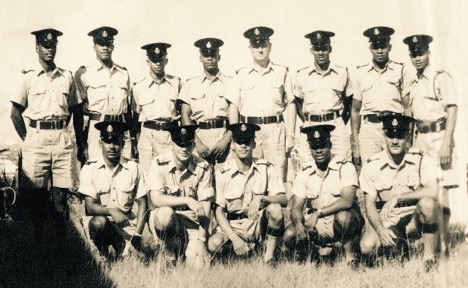 Recruits who attended a basic training course in late
Recruits who attended a basic training course in late1961 before the Training School was officially established.
Top row (l-r) Marcus Packwood, Phil Pearson, Phillip Smith,
Custerfield “Custy” Crockwell, Sgt Thomas Doyle (Instructor),
Lawrence “Mincy” Rawlins, Reginald Tuckett, and Gilmore Simons.
Kneeling - Melvin Gibbons, Thomas Barton, Glyn Washington,
Lennett “Lenny” Edwards & Eddie “Boxhead” Foggo
NEW ROLE FOR RESERVE CONSTABULARY NOTED
RG Wednesday, October 4, 1961
A redeployment of the Reserve Constabulary to bring this unit's functions more closely into line with those specified in the Police Act 1951 has been carried out. This was confirmed yesterday by the Commissioner of Police, Mr. G. H. Robins.
[The] Reserve Constabulary will no longer be seen directing traffic outside places of business or amusement in the Colony except under special circumstances, Mr. Robins said.
Spelling out the function of the reserve, he said the Act specified that when called out the Reserve Constabulary must come under his orders. His orders, he went-on to say, would be that the Reserve Constabulary fill in at police stations or at Prospect communications centers to free regular police officers for active duty in emergency (such as a hurricane).
Turning to the noticeable absence recently of reserve constables in Church Street outside supermarkets at busy times, he said it was the proper duty of regular policemen on the beat ("the beat man") to ensure a smooth flow of traffic on city streets. As to any constable being stationed at the entrance to a private parking lot to ease the egress of market-laden cars, "no vehicle emerging from a private parking lot can have priority over vehicles, using the Queen's highway ..." he remarked.
SUPERMARKET'S OWN EMPLOYEES TO CONTROL PARKING LOTS
The inference was that police constables, either regular or reserve, would no longer ordinarily be made available for such duties. Indeed, Mr. Robins said. "I have suggested to the (parties concerned) that one of their own employees suitably uniformed in a white surcoat with the firm's name on a badge, should be adequate to control (their) parking lots . . . "And much more cheaply than hiring a policeman."
Mr. Robins noted that a recent police notice, published in The Royal Gazette, had revised upward the fee for hiring a police constable for extra-duty worn by a private individual or firm to one guinea an hour. The notice, published on August 31, stated that regular policemen in duty hours would be those first made available for such services: then, regular policemen in their off-duty hours would be made available. And if the situation was that a reserve constable had to be called upon the pay scale would be the same.
BEACH PATROLS
Turning to the question of beach patrols, one of the original duties undertaken by the Reserve Constabulary when it was formed in 1951, Mr. Robins said he felt the regular police were now sufficiently organized and mobile to take care of the beaches without assistance from the reserve. "There is the parish constable who has the duty of keeping beaches in his area under surveillance,” he said, "and there are also mobile patrols on call." He remarked that special times of year, such as College Weeks, might call for a review of these routine measures.
Mr. Robins said that once proper training facilities were in train at Prospect it would be his wish "to invite the commandant of the Reserve Constabulary" to make use of the facilities for his men.
As to the internal command of the Reserve Constabulary Mr. Robins had no comment to make other than to remark that he had had no official notice of any change in its command.
Captain W. V. Ross Winter, Commandant of the Reserve Constabulary since its formation in 1951, recently told The Royal Gazette his resignation had been called for by the Governor "who had received the suggestion from the Commissioner.”
15 WOMEN APPLY FOR POLICE BASIC TRAINING COURSE
RG Wednesday, October 4, 1961
To take quick advantage of the success of the first basic training course given by the Bermuda Police Force, a second course has been planned to commence on October 16. And, as if to make the course perhaps a bit more interesting than the last, Bermuda's first women police constables will be taking part. A police spokesman said 15 women applicants took the qualifying examination on Monday, but yesterday the results of the examination were not known. The course will have openings for 12 prospective police constables and in addition to the women will include male recruits who have passed the qualifying test and several Bermudian members of the Police Force who have not yet had any formal police training.
PRE-PROMOTION
The police spokesman said it is hoped a pre-promotion course can be started towards the beginning of November. The course will run for about three months, concluding in January. The course, which is strictly voluntary, will meet two evenings a week and is open to all police officers wishing to take the pre-promotion exam.
The spokesman said the course will cover police duties, but will also include some sessions of English and general knowledge. The English and general knowledge sessions will be conducted by Mr. V. F. Scott, who conducted the highly successful "3 R's"" course which the Police Force recently sponsored.
The spokesman said the police may attempt to hold another one-month basic training course immediately upon completion of the course starting in October, if there is a need for it. There will also be another "3 R's" if there is a need.
In January the police spokesman said the police are hoping to offer their first three-month basic training course. The three-month course will take the place of the one-month course at present offered, when the new chief inspector in charge of the recruitment instruction arrives from the United Kingdom.
OTHER COURSES
At that time it is also hoped that refresher courses and sergeants' courses will be implemented in the program. In addition to this, a series of criminal investigation courses will be offered in the future. The police spokesman said the authorized strength of the Bermuda Police Force is currently 274. There are at the present time about 50 vacancies. It is hoped these vacancies can be filled by 25 local recruitments and 25 overseas recruitments. There are at the present time 58 locally-recruited men on the force.
The spokesman said the police are particularly interested in receiving applications from local male residents so they may ascertain whether the additional basic training course and an additional "3 R's" course will be needed. Applications should be directed to the Commissioner of Police, Police Headquarters, Prospect.
HIGHLIGHTS OF THE WEEK’S NEWS
RG WEEKLY Sunday, October 15, 1961
The criminal session of the Michaelmas term started on Monday in the Supreme Court with Bermuda's new Chief Justice, the Hon. Myles John Abbott, taking his seat for the first time. All eyes in the crowded courtroom were on the bench — curious to see what kind of a man the new Chief Justice would be. Present were most of Bermuda's barristers and many local dignitaries. Beside the Chief Justice, who wore the traditional wig and robes, sat the Commissioner of Police, Mr. G. H Robins.
LETTERS TO THE EDITOR
RG Saturday, October 21, 1961
Dear Sir,
May I through the medium of your most interesting column "Letters to the Editor' in your paper express a few views which I know go through hundreds of people's minds such as I yet just do not have the time to be continually writing such letters …
To Mr. Robins, our Commissioner of Police, who, I believe, is trying to streamline the force, I notice this week there is a lack of constables at pedestrian crossings adjacent to schools attending to the safety of our children. Too true, something should be done to relieve the police of this responsibility but just don't drop this duty until you have made some effort to replace this system with another.
There are hundreds of Scouts in schools that would welcome the training to become school traffic officers. They are the men of tomorrow. Why not train them now? Incidentally congratulations Mr. Grimes for your training of the Scouts in the recent Fire Display, an excellent example of what can be done with our youth.
And, lastly, Mr. Robins, should there be an accident involving children on these crossings, I hope that your conscience does the right thing. There are plenty of jobs in Bermuda for the willing worker. As a matter of fact we know of hundreds of men that are doing three jobs, not because they have to, but because the money is there and they are not too lazy to work.
BE PREPARED
RESERVES MEETING: TOPIC – RESIGNATIONS
RG Wednesday, October 25, 1961
The Bermuda Reserve Constabulary held its first meeting of the season last night at the Prospect Gymnasium. During the meeting the commandant of the Constabulary, Captain Ross Winter, and the Commissioner of Police, Mr. G. H. Robins, spoke to the assembled officers and men.
In addition members of the Constabulary's Drill Squad were awarded with sterling silver insignia pins for having carried out work beyond the call of duty. In his address, Captain Winter mentioned the recent ''unfortunate chain of circumstances" which through a misunderstanding resulted in his turning in his resignation as chief of the Constabulary. He said that the Governor had examined the situation and had seen fit to refuse the resignation. Captain Winter said that he would continue in his position to the best of his ability.
The misunderstanding in which he was involved was purely a personal one and had nothing to do with the Constabulary and was now all over and done with, he said. He particularly expressed his appreciation of the loyalty of the officers and men of the Constabulary to himself and the people of Bermuda. He declared that the Constabulary had earned the respect in which the public now held it.
MISCONCEPTIONS
He also said that recently there had been certain misconceptions about the status of the Constabulary. He wished to correct these and stated that there would be no changes. He also noted that he was not as young as he used to be and that when it was commonly agreed, whether in the near or distant future, he would step down, the very competent deputy commandant, Mr. William McPhee, would take his place.
Mr. Robins first introduced the new senior officers of the Police Department who had accompanied him to the meeting. He also explained briefly the various divisions of police work for which they were responsible.
FALSE RUMORS
Mr. Robins also noted that there had been rumors circulating to the effect that the Reserve Constabulary would be disbanded or that there would be major changes and that it faced a bleak future.
"There is no question in my mind or of my officers about the standing of the Reserve Constabulary," he said. He stated that it was a valuable and efficient volunteer body of men which could be relied upon to support the police in times of emergency. It was also an additional and tremendous asset to the police by being a liaison between the police and the general public. The Constabulary was made up of men who lived in all parts of the Colony and through their own understanding of the police and police work, could impart this knowledge to the individual citizens.
RETAINING RESERVE COMMANDMENT
The Reserve Constabulary, he said, would remain entirely under its own commandant, administratively and organizationally. It was only when the men were called out on duty to assist the police, and in the matter of enrolments and promotions that the Commissioner of Police would step in. Commissioner Robins felt that the rumors might have started "when things started to get a little off-beat" over matters such as the patrols and traffic control in front of certain food stores.
REGULAR'S JOB
He said that in his opinion the patrolling of the beaches was really a job of the regular police and that it was not right that the volunteer men of the Constabulary, who have their own daytime jobs, should be called out at night to "slog along a beach." The Commissioner also felt that the men of the Reserve Constabulary should be trained to be able to take over certain regular duties of the police so that in an emergency some of the regular police would be relieved for other work. He suggested that as part of such a training, the police station be periodically taken over and run entirely by the Constabulary for about four hours.
ON THE SPOT ~ COMMENTARY AT CEREMONY
RG Thursday, October 26, 1961
An on-the-spot commentary by Mr. Michael Fountain, assistant secretary of the Trade Development Board, did much to enhance the impressiveness of the reconvening of the Bermuda Parliament ceremony yesterday by His Excellency the Governor. The commentary, broadcast to the large crowd of residents and tourists who packed the grounds of the Secretariat, was the only innovation.
Soon after 2 p.m. the official guests began to arrive. Then at 2.15 p.m. the State landau arrived bearing Major-General Sir Julian Gascoigne and Lady Gascoigne. As the Bermuda Militia band struck up the first six bars of the National Anthem, the guard of honor presented arms and the Governor took the Royal Salute. …
After inspecting the Militia, he entered the Colonial Secretariat where members of the Legislative Council and official guests were waiting. The Black Rod, Police Commissioner Mr. G. H. Robins, was then directed to invite the members of the House of Assembly to attend the ceremony. …
TRUJILLO HAS DIPLOMATIC PRIVILEGES
RG Tuesday, October 31, 1961
What the Trujillos do on their yacht is their business according to official statements made yesterday.
A question had arisen as to the legality of crewmen aboard the Angelita carrying side arms. Spokesman both at the office of the Resident Naval Officer and at the Colonial Secretariat established that the vessel was in fact considered a civilian vessel, rather than a naval vessel.
It was stated by the Commissioner of Police, Mr. G. H. Robins, that according to information received from the Secretariat, the Generalissimo had ambassadorial rank and was entitled to diplomatic privileges. What he chose to do or have done on his yacht was his business (short of murder or some such crime). If the crew, however, came ashore armed, the commissioner said, he would have to be notified of it.
POLICE CHIEF TO VISIT BAHAMAS
RG Tuesday, November 7, 1961
The Commissioner of Police, Mr. G. H. Robins will leave the Colony at the end of the week to make a short trip to the Bahamas. He will inspect the police training programme in the Bahamas.
A police spokesman said the Bahamas police force is the closest to the Bermuda police force of the islands, in the West Indies. He termed it "quasi-military."
In Mr. Robins’ absence, Chief Superintendent F. B. Williams will act as Commissioner of Police.
THOUSANDS ATTEND IMPRESSIVE ARMISTICE DAY CEREMONIES
RG Monday, November 13, 1961
... despite bleak and grey weather which hung ominously over the Colony during the morning ……….. the units taking part gathered at their assembly points in various parts of the City and marched to their designated positions, for the main part on the lawn of the Secretariat…
Taking part in the ceremony were seventeen detachments including the Bermuda Reserve Constabulary and Bermuda Police Force led by the Commissioner of Police, Mr. G. H. Robins.
COMMISSIONER DEFINES “BEAT CONSTABLES”
RG Saturday, November 25, 1961
"The foundations of the force are the beat constables," the Commissioner of Police, Mr. G. H. Robins, told members of the Junior Chamber of Commerce during a luncheon at the Hideaway Restaurant yesterday.
He said the beat constables are in touch with the people. Mr. Robins said he was "absolutely convinced that the old Bermuda idea of one parish, one constable is absolutely right.”
He said today there are 12 parish constables, as in highly populated Warwick and Pembroke there are two parish constables and St. David's Island also has a constable.
He said every facet of police work involves human problems. "The parish constable is the man who I hope will get to know every man, woman, and child, especially the children in the parish."
Mr. Robins said he hoped that in time the parish constable would be well known to everyone in his parish as then the people could "talk to him as a friend, not just a policeman."
'The Commissioner continued that he hoped, that in a time of disaster, such as a hurricane, eventually the parish constable would be the first person to whom the people would turn. Mr. Robins said he had spoken to Commander I. S. Primrose, captain of H.M.S. Londonderry, who told him that in the small villages in British Honduras with local constables there was far more order than in cities like Belize before outside security forces arrived.
Mr. Robins explained that the parish constable has a 24-hour responsibility in his parish. He said the constables are allowed to do their job as they wish. "All I want is results."
Mr. Robins explained to the Jaycees the organization of the Bermuda Police Force. He said the headquarters at Prospect were purely administrative. They deal with the human side of the police force. At the headquarters there were administrative and financial, criminal, operational, and special divisions.
The operations room, Mr. Robins said, was the heart of the force. It was in operation 24 hours a day and was the communications center of the force. He described it as the "crash side" of the force as it dealt with the things that require immediate attention as opposed to subsequent investigation which sometimes stemmed from it.
He said that the Colony was now divided into three divisions; East, West and Central. Each of these was headed by an inspector and he was the man Mr. Robins said people should get in touch with for ordinary problems. In emergency he said people should still call 2-2222.
LETTERS TO THE EDITOR
In the public interest Police Commissioner George Robins sought to correct a misquotation first published on November 27th in the Royal Gazette which was repeated in the Bermuda News Pictorial on December 2nd concerning speed prosecutions.
December 4th. 1961
Police Headquarters. Bermuda.
The Editor,
The Royal Gazette,
Dear Sir,
I attach for your information a copy of a letter which I have today addressed to the Editor, Bermuda News Pictorial, and, should be grateful if you would give publicity to this letter in order to correct the misapprehension which may grow in the public mind.
The misquotation appeared in The Royal Gazette dated November 27th, 1961.
Yours faithfully,
G. H. ROBINS
Commissioner of Police
Dear Sir,
Unhappily further publicity has been given in "Table Talk" appearing in the Bermuda News Pictorial dated Saturday, December 2nd 1961, of a misquotation attributed to a police prosecutor.
The police prosecutor was reported in a paper dated November 27th as saying "it is unusual for policemen to report speeders going under 30 m.p.h."
The prosecutor is certain that this is not what was said and His Worship the Magistrate has been good enough to confirm this.
In order that there shall be no misunderstanding in the minds of the public it is only fair to say:
(a) that the Police have no power nor wish to alter the law:
(b) that the Police enforce the law:
(c) the speed limit is still 20 m.p.h. with lower limits in certain specific areas;
(d) that any motorist exceeding the limit is liable to prosecution by the Police.
In the public interest, I shall be grateful if you would give publicity to this letter, a copy of which is being sent to the paper which originally misquoted the police prosecutor.
Yours faithfully,
G. H. ROBINS
Commissioner of Police.
POLICE TO DON NEW HELMET AND UNIFORM SOON
RG Wednesday, December 27, 1961
The early part of the New Year should see a "New Look" among the Colony's policemen. They are soon to begin wearing "Bobby-type" helmets instead of caps, it was revealed last night, following a suggestion made by Commissioner of Police, Mr. G. H. Robins, when he took over as commissioner in April this year.
The first public appearance of the new helmets will be on January 4 when the Governor inspects the Police Force at Prospect. A contingent of police who will be on parade will wear the new helmets and a new dress uniform. It has not yet been decided, a police spokesman said, when the policeman on the beat will throw away his old cap and put on the "London Bobby-type" helmet, but it is thought the first part of January should see this innovation take effect.
At the annual inspection, the policemen on parade will wear blue helmets, adorned in the front with a badge made up of a star and crown with the letters "E. II R." in silver. On the crown of the helmet will be affixed a baseplate and spikes and at either side, a metal chin-strap will be affixed to two metal roses. This follows the English pattern. This helmet, however, the spokesman went on, is only to be worn on ceremonial occasions. The helmet in everyday use will not have the spike but a crown piece depicting a large wild rose, and the strap will be a leather one, rather than metal.
The ceremonial uniform will consist of a white Prussian or stiff collar jacket with bright buttons; a blue cloth belt with a bright metal clasp on which will be affixed a Bermuda badge; blue trousers and white gloves.
OFFICERS' DRESS
The dress for officers on ceremonial occasions will differ in that they will wear blue caps, not helmets, and a Sam Browne belt instead of the blue cloth belt.
The reason for the change, the spokesman said was to ''smarten the men up." However, when Mr. Robins made his suggestion in April, he added that the helmet gave a policeman two to three inches of extra stature, it was cool and light, offered protection from assault, did not lose shape, was traditional and was British.
One of the faults of the caps now worn is that when they are wet, they crinkle at the top and generally look "very poor." Policemen in cars will not wear the helmets. They will stick to their caps, which allow a little more headroom.
GOVERNOR HANDS OUT ‘BIG TWO’ CONFERENCE BOUQUETS
RG Saturday, December 28, 1961
Congratulatory messages from the Governor, Sir Julian Gascoigne, have been sent to a number of groups in the Colony for the work done during the period of the Big Two conference last week.
Mr. W. James Williams, executive director of the Trade Development Board, was congratulated on the work which his staff had done. "The arrangements for the press, in particular, were, I am told, excellent," wrote Sir Julian, "and, as a result, a large and influential group representing many of the leading newspapers in the world have taken away with them a very favorable impression of friendliness and efficiency, which will add to Bermuda's reputation as a convenient locale for British-American conferences."
His Excellency asked that special thanks be conveyed to Mr. Colin Selley, manager of the Bermuda News Bureau, who was in charge of detailed arrangements for the press. Mr. G. H. Robins, Commissioner of Police, and through him all the members of the Bermuda Police Force, were thanked "for the very efficient manner in which they performed their various duties during the past few days."
FAULTLESS
Wrote Sir Julian, "The security and travel arrangements for which you were responsible worked faultlessly and the conduct and appearance of all members of the Police Force was a credit to them and to the Colony." …
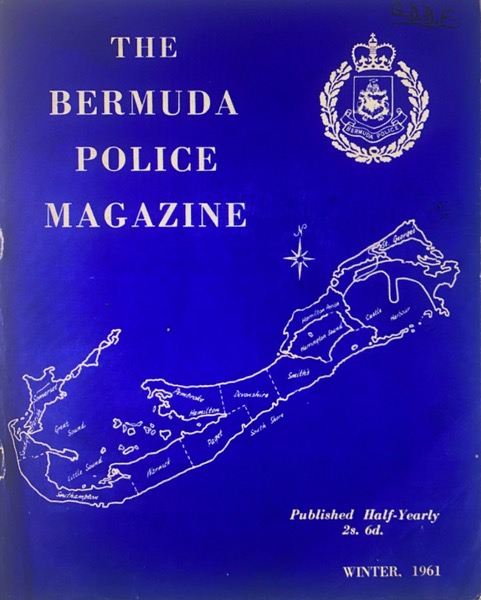
Editors Note - We conclude this article with a letter from Commissioner Robins to all police personnel as it was published in the 1961 Winter edition of the Police Magazine.
Police Headquarters
Bermuda Islands
"Unique" is a much abused word but it must surely be unique for all the Senior Officers' posts to be filled within three months by "new boys". The only one that was not brand new was myself and I had been less than a year in Bermuda. It therefore speaks highly for the foundations of loyalty and pride in the Force laid by our predecessors. To them I am personally grateful for the foundations they laid; to the Force and to all those in non-established posts, the senior officers and I are grateful for their patience, goodwill and wholehearterd cooperation that has been given to us. With the help of all much has been achieved. If we all continue to work together I know we can give to Bermuda a Police service which will be second to none.
To all ranks, and their families, and to all civilian staff I say "Thank you" for your tolerance in 1961 and send my best wishes for 1962, when we will take further strides forward.
G.H. ROBINS
Commissioner of Police
Published 23rd November 2024

 Gerry Lyons, Phil Scarcliffe and Wayne Perinchief
Gerry Lyons, Phil Scarcliffe and Wayne Perinchief


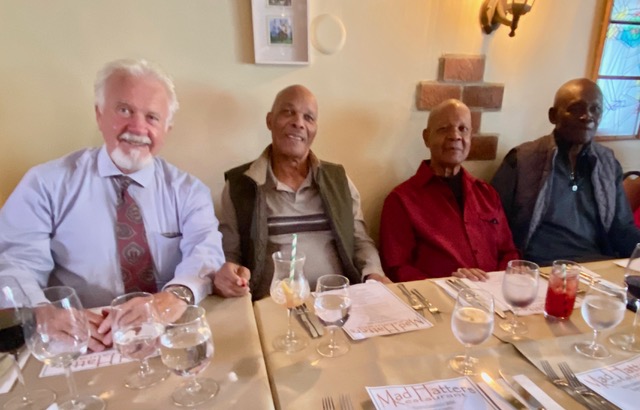






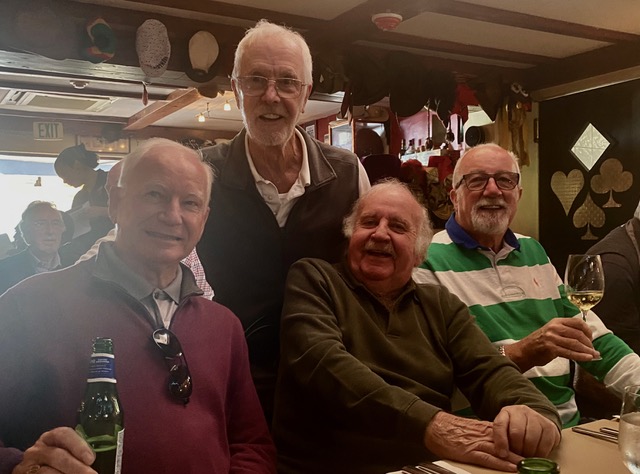

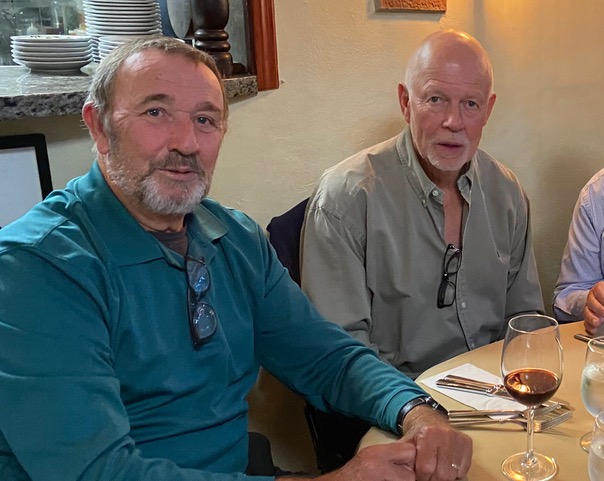



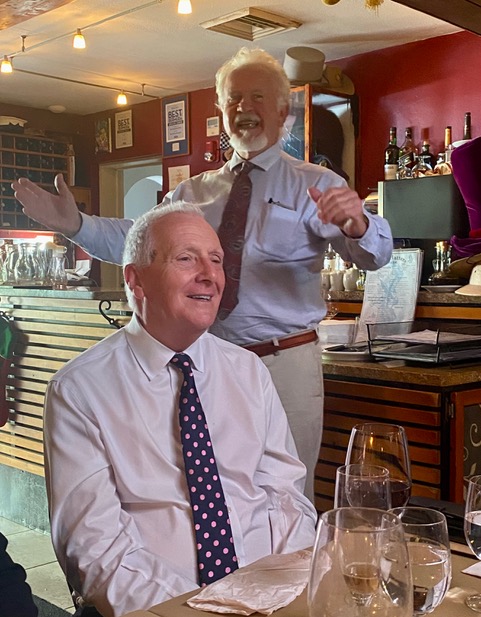
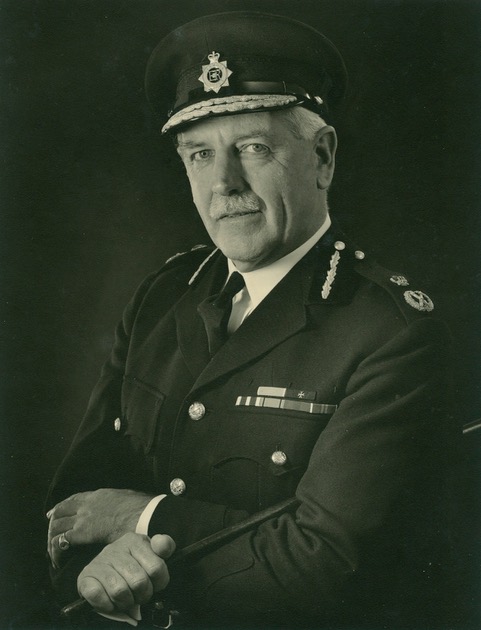



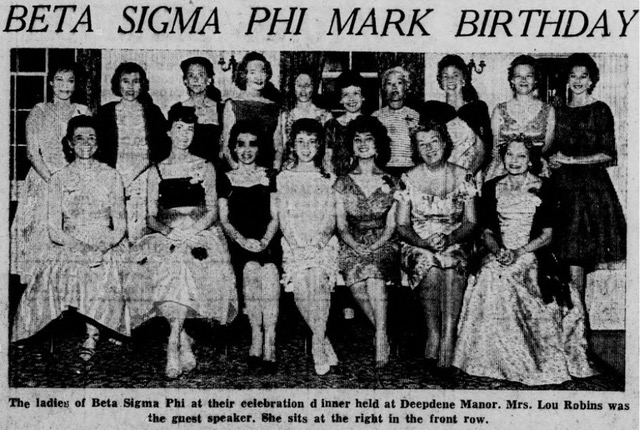




 Woman Inspector Jean (Mathis) Vickers
Woman Inspector Jean (Mathis) Vickers